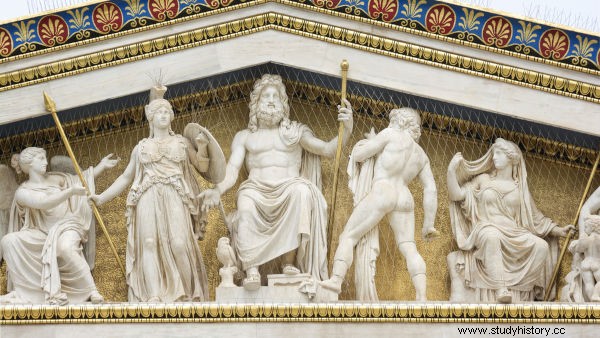The gods Greeks were the deities that were part of the traditional religion of Ancient Greece. The Greeks believed that their gods had human form and had feelings typical of humans, such as joy, hate and sadness. They could directly interfere in the lives of human beings and resided on Mount Olympus.
Also :How was education practiced in Ancient Greece?
Understanding the religion of the Greeks
When we talk about gods, we are referring to the deities that were part of the religiosity of the ancient Greeks. Currently we popularly refer to this religiosity as mythology Greek and all the beliefs that were part of Greek religiosity had a significant importance in the life of that society.

The Greeks were polytheists and therefore believed in a series of gods, supernatural and immortal beings who represented the forces of nature and important, abstract values such as justice and beauty. Beliefs in each god, as well as their attributes and other religiosity issues, varied from region to region in Greece. Thus, a god could be much more important in one place than another and could even have different characteristics according to where in Greece he was. In any case, the Greeks in general believed that some of their gods resided in a palace built on top of Mount Olympus .
The gods who resided in this location were known as gods Olympics and traditionally it is said that there were 12 Olympian gods. Still, it's important to mention that not all Greek gods resided on Olympus. Hades, for example, resided in the underworld, and Poseidon, despite having an abode on Olympus, resided in the seas.
The Greeks believed that their gods had form body human and they went through dilemmas similar to those of mortals. Thus, they rejoiced and became angry like any human, in addition to falling in love, feeling jealousy, envy, etc. There were legends in Greek religion that narrated the involvement of gods with humans and even the birth of children between gods and humans.
The Greek gods fed of ambrosia and nectar , foods that were consumed exclusively by the gods, because the human who consumed one of the two would die. Traditionally, ambrosia is understood to be a food, and nectar a drink, both of which are responsible for guaranteeing immortality to the gods.
All the stories we know of the Greek gods were handed down by storytelling from generation to generation. The oral tradition ended up being transcribed into texts that are attributed to Homer and Hesiod . Both recorded important stories that narrate situations involving the Greek gods. Homer is known as the writer of Odyssey and Iliad; Hesiod is known for a book called Theogony .
Login also :The mysterious epidemic that struck the city of Athens in the 4th century BC
How did the Greek gods come about?
The myths that were part of Greek religiosity also narrated the origin of the gods. Zeus, for example, has its origin linked to the history of the emergence of the Universe. In the beginning of time, the Universe was formed by a formless and disorganized cosmic mass that was known to the Greeks as Chaos.
From Chaos came Gaia (the Earth) and Uranus (the Starry Sky). From their union several children were born, among them Cronos , a titan who turned against his father, castrating him and robbing him of his place as king of the Universe. Uranus cursed Kronos for turning on him, causing Kronos to become paranoid with fear.
Cronos was a titan, a gigantic being that inhabited Earth before humans, and was married to Rhea, a titan. Together they had several children, but Kronos' fear of Uranus' curse caused him to devour his own children in order to prevent any of them from turning against him.
Unfortunately for Kronos, his wife tricked him into saving Zeus from his brothers' fate. Zeus was not devoured and grew up hidden from his father. Years later, Zeus returned to fight his father and save his brothers . Zeus was successful in rescuing the brothers and started a war that resulted in the defeat of Kronos and the Titans.
The titans were imprisoned in Tartarus and Zeus became the new king of the Universe. He was also the king of the gods and, with two of his brothers, he divided each other's domains:Zeus took the heavens; Poseidon, with the seas; and Hades, with the underworld.
In addition to Hades and Poseidon , Zeus' other brothers were Hera , Hestia and Demeter . All six were considered gods to the Greeks.
Login also :Myth of King Midas — the narrative that explores human greed
Olympic Gods
With a few exceptions, the main gods of Greek religion were the Olympian gods, which, as we have seen, were the gods who resided on the summit of Mount Olympus. We also saw that these gods were twelve in total, so they were part of the dodecateon , the pantheon of twelve gods.

Greek religion and belief in the gods that were part from it were transported to Ancient Rome. In Rome, Greek gods were given Latin names , although the attributes were similar. These were the Olympian gods and their names in Rome:
| God | Roman name | Attribute |
| Zeus | Jupiter | King of the gods, ruler of Mount Olympus, god of the sky, lightning, thunder, etc. |
| Ivy | Juno | Queen of the gods, goddess of marriage, women, family, etc. |
| Poseidon | Neptune | God of water, seas, storms, etc. |
| Athena | Minerva | Goddess of wisdom, crafts, etc. |
| Ares | Mars | God of war, violence, etc. |
| Demeter | Ceres | God of agriculture, harvest, seasons, etc. |
| Apollo | Phoebus | God of poetry, music, arts, philosophy, etc. |
| Artemis | Diana | Goddess of the hunt, the moon, virginity, etc. |
| Hephaestus | Vulcan | God of fire, metallurgy, inventions, volcanoes, etc. |
| Aphrodite | Venus | Goddess of love, fertility, beauty, passion etc. |
| Hermes | Mercury | Messenger of the gods and god of commerce, communication, diplomacy, travel etc. |
| Dionysus | Bacchus | God of parties, wine, theater, etc. |
Some scholars often consider Hestia as part of the Olympian gods, but traditionally, she was not seen as such. She was a goddess responsible for the order of homes and was the goddess of family, home and state. She was known as the first child of Kronos' relationship with Rhea and was called by the Romans Vesta .
As mentioned, despite Hades being an important god for the Greeks, he was not part of the Olympian gods, simply because he did not reside on Mount Olympus. He was the god of the underworld, the place the Greeks believed the dead went. This fact made the Greeks very afraid of Hades and even the mention of his name was avoided. The Romans knew him as Pluto .
Image credits
[1] Photo Oz and Shutterstock
